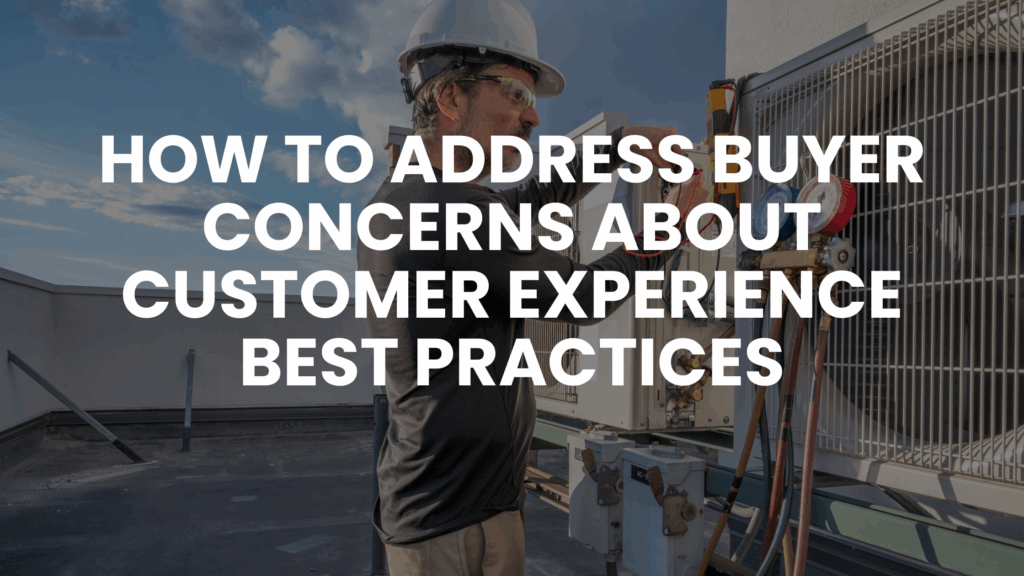When selling your HVAC business, one of the key areas buyers will focus on is the customer experience. They want to know that your business delivers exceptional service and retains loyal clients. However, addressing buyer concerns about customer experience best practices can sometimes be challenging, especially if you haven’t fully optimized your customer service processes. Fortunately, with the right approach, you can effectively address these concerns and demonstrate that your business is built on a foundation of outstanding customer relationships.
Understanding Buyer Concerns About Customer Experience
Before diving into how to address concerns, it’s important to understand what they are. Buyers are often concerned about the sustainability of customer loyalty, service consistency, and the potential cost of improving customer experience post-sale. They want reassurance that your business isn’t just surviving on a few loyal clients but is capable of attracting and retaining customers long-term.

How to Address Buyer Concerns
1. Provide Clear Metrics and Data
One of the most compelling ways to address concerns about customer experience best practices is by offering clear, measurable data that reflects your commitment to customer service. Buyers want to see numbers that demonstrate your business’s success in customer satisfaction and retention. Highlight key performance indicators (KPIs) such as customer satisfaction scores, Net Promoter Score (NPS), customer retention rates, and online review ratings. These metrics will show that your business is consistently meeting customer expectations and will reassure potential buyers that they are acquiring a company with a solid customer base.
2. Show Evidence of Customer Feedback and Improvements
Buyers will be more comfortable with your business if they see that you are actively seeking customer feedback and making improvements based on that input. If you’ve implemented customer surveys, follow-up calls, or other methods of gathering feedback, make this part of your pitch. Show how you’ve used feedback to refine processes, improve service offerings, or resolve customer pain points. This proactive approach to customer service not only strengthens your business but demonstrates to buyers that you are committed to continuous improvement.
3. Demonstrate Consistency in Service Delivery
Consistency is key to maintaining a high level of customer satisfaction. If you can show that your HVAC business has reliable processes in place to ensure the same high-quality service is delivered every time, this will ease buyers’ concerns. This might include staff training programs, service level agreements (SLAs), or even automated scheduling and communication systems that ensure customers have a consistent experience. Buyers are more likely to be interested in a business that has predictable and repeatable results, as it signals long-term stability.
4. Leverage Customer Testimonials and Case Studies
Real-world examples can be powerful tools for addressing buyer concerns. Share testimonials and case studies from satisfied customers to illustrate the impact of your customer experience best practices. Positive feedback from your clients not only validates the quality of your service but also reinforces the idea that your business has built strong, loyal relationships. This can help alleviate any concerns about your business’s ability to attract and retain clients.
5. Highlight Retention Strategies and Loyalty Programs
A strong customer retention strategy can greatly increase the perceived value of your business. Demonstrating that you have systems in place to retain customers—whether through loyalty programs, maintenance contracts, or follow-up services—can reassure buyers that your customer base is not just made up of one-time clients. A loyal customer following is an asset that will continue to generate revenue for the business long after the sale. Be sure to highlight these strategies when addressing buyer concerns.
6. Prepare for the Transition
One of the biggest concerns buyers have about customer experience is how the transition of ownership will affect existing relationships. Buyers may fear that changes in leadership could disrupt customer service. Address this concern by outlining a clear plan for transitioning customer relationships. Show how you will ensure that the business continues to meet customer expectations during and after the sale. Providing this assurance can help alleviate concerns and make the business more attractive to potential buyers.
Conclusion
Addressing buyer concerns about customer experience best practices is essential when selling your HVAC business. By providing data, demonstrating service consistency, leveraging customer testimonials, and highlighting retention strategies, you can prove that your business is built on a strong foundation of customer satisfaction. Taking these steps will help ensure that your HVAC business attracts the right buyer and sells at the best price and terms.
If you need additional support preparing your business to sell or would like to sell now, text or call Scale or Exit Partners at (832)745-2721. You can also email us at garyd@scaleorexit.com. For more information about Scale or Exit Partners, visit our website at www.scaleorexit.com. We have access to investors who are ready to buy now, and if you want to get the best price and terms for a future sale, we can help you get ready.
